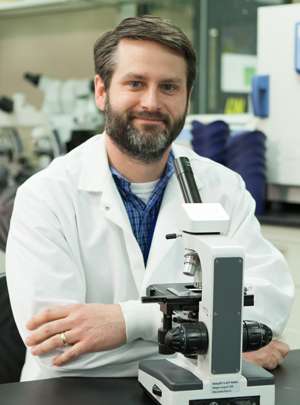Scientist models Smith-Lemli-Opitz syndrome in adult stem cells

Studies performed by a Sanford Research scientist using an innovative stem-cell model for a fatal developmental disorder is the focus of a recent study published in Nature Medicine. Kevin Francis, Ph.D. uncovered unique cellular defects associated with Smith-Lemli-Opitz syndrome (SLOS) by modeling this disease using induced pluripotent stem cells.
Francis' study is titled "Modeling Smith-Lemli-Opitz syndrome with induced pluripotent stem cells reveals a causal role for Wnt/β-catenin defects in neuronal cholesterol synthesis phenotypes."
SLOS is a rare developmental disorder caused by mutations in the enzyme DHCR7 responsible for the final step in the production of cholesterol. DHCR7 mutations prevent 7-dehydrocholesterol (7DHC) conversion to cholesterol. Impaired cholesterol synthesis underlies a group of human disorders, including SLOS, that are characterized by cognitive impairment, congenital malformations and distinct behavioral phenotypes, including autism. Specific to SLOS, patients experience delayed development and malformations in certain organs like the brain, heart and liver.
Francis and his team used induced pluripotent stem cells, which have the ability to form many types cells, derived from patient skin cells to reveal novel changes in cellular events regulated by cholesterol synthesis, including a set of proteins critical for brain development and function known as the Wnt signaling pathway. Further, Francis noted that 7DHC accumulation, not cholesterol deficiency, was a hallmark of these cells.
More information: Kevin R Francis et al, Modeling Smith-Lemli-Opitz syndrome with induced pluripotent stem cells reveals a causal role for Wnt/β-catenin defects in neuronal cholesterol synthesis phenotypes, Nature Medicine (2016). DOI: 10.1038/nm.4067

















